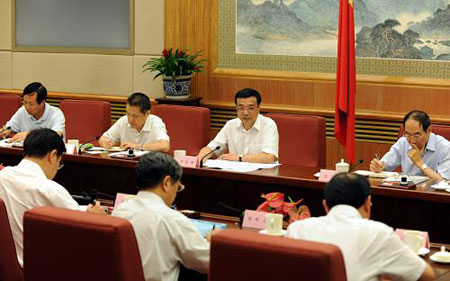Chinese Vice Premier Li Keqiang on Thursday called for setting up a system to ensure accessibility to essential medicines and a pilot reform of state-run hospitals to bring real benefits to the people.
|

|
|
Chinese Vice Premier Li Keqiang holds meeting and calls for setting up an essential medicine system on Aug. 13, 2009. Li, also head of the State Council's advisory group of health care reform, said at the meeting that an essential medicine system will help safeguard people's safety in using drugs and cut their medication costs. |
Li, also head of the State Council's advisory group of health care reform, said at a meeting that an essential medicine system will help safeguard people's safety in using drugs and cut their medication costs, according to a statement issued Thursday by the meeting.
A list of drugs, one of the most important components of the new essential medicine system the government is putting into place, had been determined, according to the advisory group earlier this month. The drugs listed would be provided to hospitals at controlled low prices.
By the end of this year, about 30 percent of state-owned community health institutes and county-level hospitals are asked to only use drugs on the list and should make no profit in selling the drugs.
By 2011, all state-owned grassroots health institutes should use drugs on the list and other health institutes should give priority to using them.
Each province, autonomous region and municipality should select several cities to carry out reform on state-run hospitals this year. In the next three years, authorities should draw experience from the pilot projects to push forward the reform across the country.
Both the establishment of an essential medicine system and the pilot reform of state-run hospitals are major projects, which are time-consuming, challenging and complicated, Li said.
The reform tasks must be carefully organized and all sectors should be motivated to participate in the initiative, he said.
The two reform tasks are part of China's three-year plan on health care reform unveiled in April this year, whose aim is to lay a solid foundation for equitable and universal access to essential health care for everyone in China by 2020.
The 850 billion yuan (124 billion U.S. dollars) plan for 2009 to 2011will provide for universal access to basic health insurance, the introduction of an essential medicine system, improved primary health care facilities, equitable access to basic public health services and pilot reform of state-run hospitals.
(Xinhua News Agency August 14, 2009)